Any regime can control its people through a combination of force and fear. But as Egypt's President Hosni Mubarak learnt this week, when people have nothing, they have nothing to lose. By J BROOKS SPECTOR.
Quite suddenly it seems (though it’s been three decades), the circumstances of an Egypt seemingly frozen in amber may have been decisively shattered. Following closely on Tunisia’s Jasmine Revolution a few weeks ago and likely having drawn inspiration from those events, huge crowds of demonstrators have taken to the streets in Cairo, Alexandria, Suez and elsewhere, set ruling party headquarters on fire and looted and torched government buildings. Demonstrators chanted, “Tunis, Tunis, Tunis”, “Leave, leave,” and “Down, down with Mubarak”.
Reports said the demonstrators avoided attacking the national museum, but the US Embassy came under attack at one point. Not surprisingly the US government and other western nations are now issuing travellers’ advisories cautioning visitors to avoid Egypt.
Watch Al Jazeera on fresh demonstrations in Egypt.
Some analysts point to the stunning impact of Al Jazeera television broadcasts and cellphone and social networking communications – similar to events in Tunisia. In Egypt rising protests have also drawn their power from decades of political repression and economic stagnation.
Nevertheless, steadfastly refusing to yield, 82-year-old President Mubarak ordered a shutdown of cellphone communications (since restored) and national Internet access, deployed police and security forces to quell the unrest, fired his entire cabinet, and reportedly put former UN nuclear inspection agency head Mohammed el-Baradei under house arrest, all in an effort to hold onto power. El-Baradei had earlier returned to Egypt with the apparent intent of leading electoral opposition to Mubarak’s presidency. Earlier on Friday, after leaving a mosque and being sprayed by a water cannon, El-Baradei had told reporters, “This is the work of a barbaric regime that is, in my view, doomed. It is the people versus the thugs.”
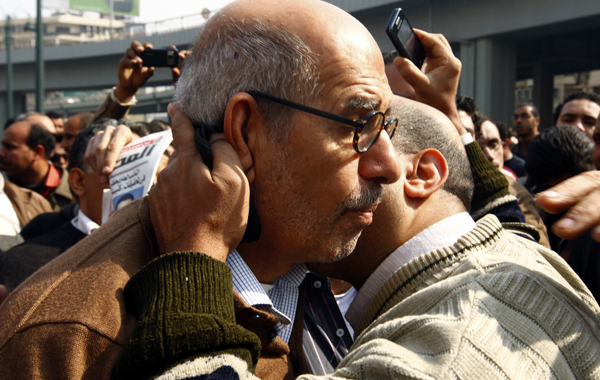
Photo: Opposition leader Mohamed El Baradei (L) is greeted by followers and protesters during Friday prayers before a protest in Cairo January 28, 2011. President Hosni Mubarak said on Saturday that Egypt needed dialogue not violence to end problems that led to days of protests and said he was sacking his government, speaking in an address on state television. REUTERS/Yannis Behrakis
But, disregarding the national curfew that was also part of Mubarak’s attempt to stem the tide of protest, demonstrators continued to form crowds in the country’s major cities throughout Friday evening. Overnight, protestors sometimes gained the upper hand over the security forces as demonstrators sacked police stations.
Meanwhile, as Mubarak spoke to the nation on television to pledge installation of new government ministers, he simultaneously labelled the demonstrations, “part of bigger plot to shake the stability” of Egypt. He also refused to resign, adding, “I will not shy away from taking any decision that maintains the security of every Egyptian.”
Crucial questions for which there are as yet no definitive answers include whether Egypt’s security troops and the military will be able to enforce Mubarak’s curfews and his call to restore public order. In addition, it remains problematic whether they – and their generals – will continue to do so on behalf of an ailing, 82-year-old man who has been sitting atop the political heap continuously since October 1981 following Anwar Sadat’s assassination.
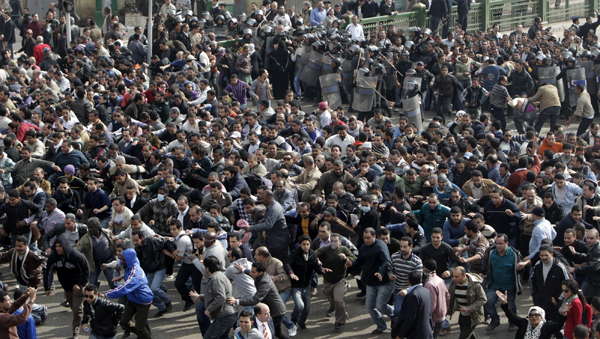
Photo: Protesters flee from charging police during clashes in Cairo January 28, 2011. Police and demonstrators fought running battles on the streets of Cairo on Friday in a fourth day of unprecedented protests by tens of thousands of Egyptians demanding an end to President Hosni Mubarak’s three-decade rule. REUTERS/Amr Abdallah Dalsh.
And beyond the immediate issues posed by the impact of the protests and running street battles between demonstrators and police, there is the more complex question of the role of the Islamic Brotherhood. A member of the Islamic Brotherhood, Gamal Tag Eddin told reporters, “We decided to participate in full force today because we felt the people were starting to respond. We could not participate alone because the government uses us to scare people here and abroad. Now that the people have moved, the Brotherhood are in with all their members in order to bring down this oppressive regime.”
Nonetheless, it remains an open question as to whether this religiously based, shadowy opposition group will totally join in the growing street protests and whether they will then attempt to gain the leadership of what has so far been a nearly spontaneous street movement. Beyond these questions looms the possible impact of these protests and resulting crackdowns on an already-tense relationship between Egypt’s majority Islamic population and the much smaller (about 10%), ancient Coptic community.
The events in Egypt have posed a serious problem for the US as well. Since Anwar Sadat broke ranks to make peace with Israel in 1979, Egypt has been one of Washington’s crucial Mideast allies, receiving billions of dollars of military and economic aid as a consequence of that decision. Following Mubarak’s Friday night speech on television, Barack Obama responded with his own call on US television for Mubarak to embark on “concrete steps” toward his pledges of major political and economic reforms and a “meaningful dialogue” with the Egyptian people. But Obama stopped well short of calling for Mubarak to step down.
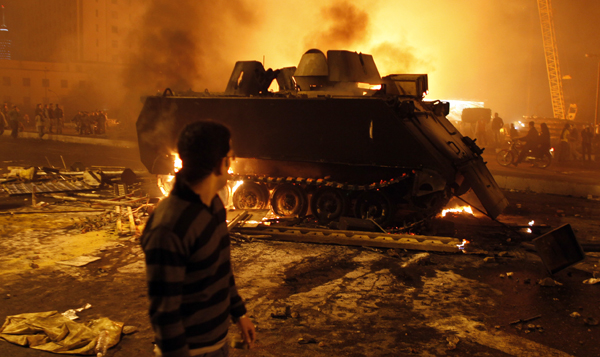
Photo: A protester looks at a burnt Egyptian Army armoured vehicle in downtown Cairo January 28, 2011. President Hosni Mubarak ordered troops into Egyptian cities on Friday in an attempt to quell street fighting and growing mass protests demanding an end to his 30-year rule. REUTERS/Goran Tomasevic.
The conundrum for the US, and for nearby Israel as well, is that appearing to back Mubarak, now, only to watch him fall from power, would almost certainly have major consequences for America’s strategy in the Middle East. But it is just as true that there is no clarity about who could be the ultimate winner in a post-Mubarak power struggle. Backing Mubarak’s street-based opposition runs the risk of gravely harming Washington’s long-time, warm ties with the Egyptian government, should Mubarak ultimately survive this current crisis.
Those who argue that the military may ultimately make the final move to replace Mubarak point to the fact that Egypt’s military is one of the country’s most respected institutions. Unlike Tunisia’s small army, Egypt’s military has traditionally been supportive of its own ranks and generals-turned-politicians, not least of all Hosni Mubarak. Military officers like Muhammed Naguib and Gamal Abdel Nasser led a coup that pushed aside an indolent, British-sponsored monarch, Farouk I, in 1952. And all three of Egypt’s subsequent leaders similarly came to power via their place in the country’s military. Over the years, Egypt’s military has become a key player in the nation’s economy as well.
Whoever prevails in Egypt in the current upheaval, and the now-spreading unrest in the Arab world, has enormous implications for the entire region. This ranges from what seems to be a receding tolerance for long-lived, secular autocrats by large, youthful populations frustrated by a lack of economic or political opportunities to the viability of opposition groups and leaders kept powerless or locked away for years. Moreover, other regional governments, or even the new regimes that follow the deposing of the older generation of autocratic leadership may attempt to deflect dissatisfaction away from them and towards the US or Israel – further upsetting American efforts to somehow reach a settlement between Israel and the Palestinians.
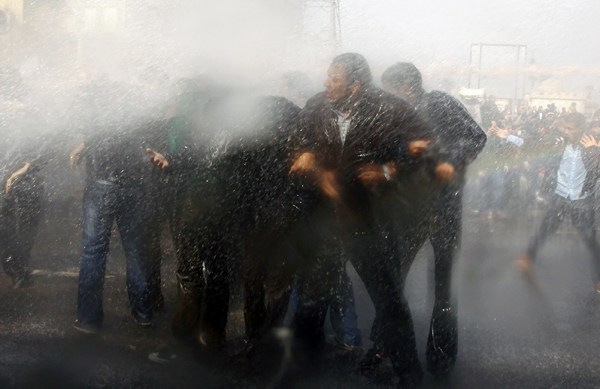
Photo: Protesters stand in front of a police water cannon during clashes in Cairo January 28, 2011. President Hosni Mubarak said on Saturday that Egypt needed dialogue not violence to end problems that led to days of protests and said he was sacking his government, speaking in an address on state television. REUTERS/Yannis Behrakis.
While the Mubarak regime has, so far, successfully defeated opponents ranging from the Islamic Brotherhood to external terror groups as well as a range of other would-be opponents, these new protests seem to be a very different challenge. They represent a broad swath of the country’s population – the young and old, the westernised middle-class and traditionalist galabeya-clad men, labourers and cultural icons.
On Friday, after midday prayers, thousands of Egyptians rallied in Tahrir Square and clashed with police firing tear gas at them. The chaos finally pushed Mubarak into sending military units into the downtown areas of major cities throughout the country to impose the curfew.
Throughout the day police fought off protesters in front of mosques, bridges and strategic intersections using tear gas, high pressure water cannon, rubber-coated bullets and, ultimately, live ammunition. Police attempted to hold the strategically located Kasr al-Nil Bridge, but were eventually overwhelmed. Sources say nearly 1,000 people have been injured and hundreds were in hospital with serious to critical injuries.
Satellite television networks like Al Jazeera, bundled together with electronic communication tools such as social networking, and a generation’s worth of pent-up political, economic and social demands – as well as a sense of desperation on the part of relatively well-educated, largely powerless young people – may be coalescing into a new, potent political force in the Mideast. This wave may transcend many of the old political truths of the region. But it is still unclear how this rage will translate into actual politics – let alone effective governance. The great 19th century scholar of America and France (and an acute observer of czarist Russia as well), Alexis de Tocqueville, was of the opinion that the most dangerous times for corrupt regimes are when they move towards reform.
In De Tocqueville’s time, that period of danger could often be measured in years, but in our own time it now seems this dangerous period only lasts for a few weeks at most before a regime is pushed aside or it decisively reforms. If the unrest in Tunisia and Egypt spreads beyond to the nations of the western Mahgreb, and the Persian Gulf and Arabian Peninsula (remember all that oil, that natural gas, those strategic locations), we may well end up calling 2011 one of those decisive years in contemporary history. DM
Read more: Mubarak vows cabinet shift but defends deploying army as revolt sweeps Egypt in The New York Times, How do you solve a problem like Mubarak? in The New York Times, Egypt: Mubarak sacks cabinet and defends security role at BBC, P.J. Crowley’s Twitter Diplomacy at CBS, Cairo in near-anarchy as protesters push to oust president at Washington Post, Egypt protests: US speaks again, but no one seems to be listening – secretary of state Hillary Clinton’s comments on the Egypt protests – Friday call on President Hosni Mubarak to embrace reforms. But he hasn’t paid the US heed during the crisis at CS Monitor.
Photo: A protester burns a picture of Egypt’s President Hosni Mubarak during clashes in Cairo January 28, 2011. Police and demonstrators fought running battles on the streets of Cairo on Friday in a fourth day of unprecedented protests by tens of thousands of Egyptians demanding an end to Mubarak’s three-decade rule. REUTERS/Amr Abdallah Dalsh.

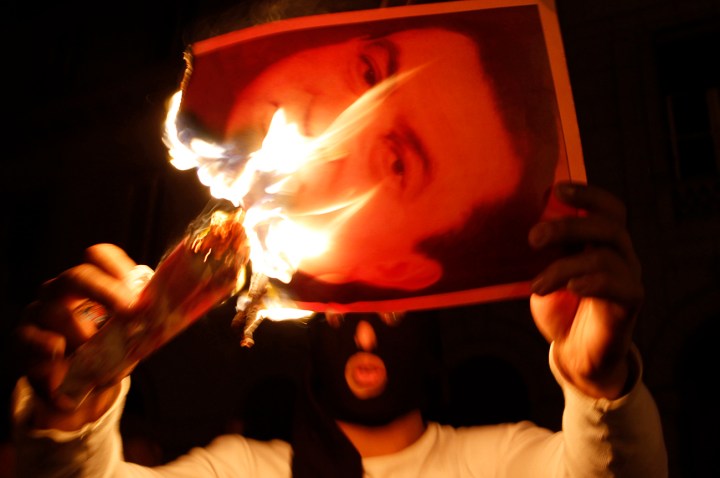
















 Become an Insider
Become an Insider